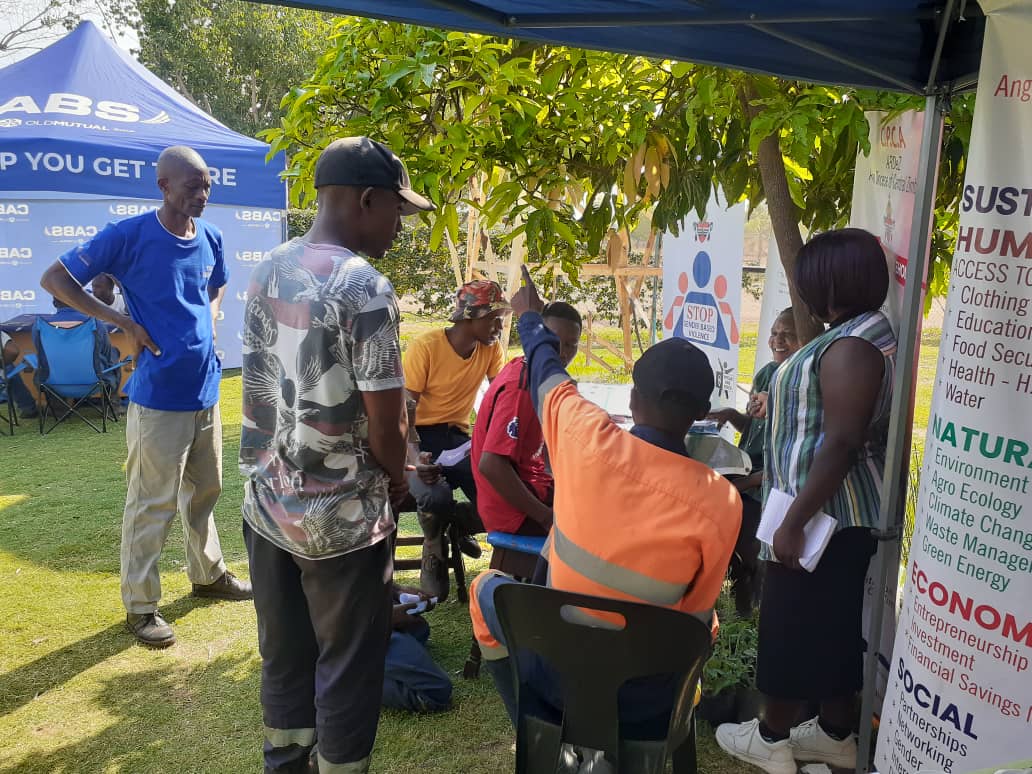|
Getting your Trinity Audio player ready...
|
Writes Rebecca Munetsi
‘These herbs you are showing us here, are for women (lavender, mint, and rosemary). You should have brought strong herbs for men like us. It is a male-dominated workspace here,” says one miner who visited the Community Capacity Initiative Center For Africa (CCBICA) Stand during the Rio Zim Mine Wellness Week.
The mining industry is one of the most risky environments to work in. The miner at the herbs stand also indicated that their job has highly risky conditions which sometimes severely affects the worker’s safety and health, leading to ailments and disabilities.
‘As miners, we suffer from typical occupational diseases such as silicosis and tuberculosis due to things such as dust exposure, vibrations, noise, injuries, and accidents from the blasts. We also work from long distances and isolation from our families. Thus we are grateful for this wellness week, where we take time to look into our wellbeing and health. Getting tested early for any disease is very important in preserving one’s life and those around you,” he added
The mine organised a wellness week at the Rio Gold Cam and Motor Mine recently. The event saw at least 1500 people including miners and members of the community who came from surrounding communities visiting the stands. The miners, the majority of whom are men, were encouraged to get tested for lung cancer and prostate cancer for early detection and treatment. Also available were medical screenings and testing for various ailments such as STIs, blood pressure, diabetes and HIV/Aids, TB screening, and cholesterol.
Medical institutions present included the Population Services, Cimas iGO, and African Diagnostics. The miners were advised to get tested for breast, cervical, and prostate cancer. The miners and the general public were also advised on ways of living a healthy lifestyle such as getting HIV tests, and regular health check-ups for cancer, sugar, and high blood pressure. Some were also encouraged to reduce alcohol intake, quit smoking, eat healthy, and find inner peace and happiness at work and home.
During the Wellness Week, various institutions showcased their best practices in promoting health and wellbeing for the miners and eliminating hindrances that employees have in seeking medical care. Health experts say the mining industry should consider the well-being and health of its workers because sometimes the mining job exposes miners to physical, mental, and spiritual challenges.
Speaking during the closing ceremony of the Wellness Week, Rio Zim Senior General Manager, Mr Tendai Kadyamusuma, said the mine is intentionally promoting a culture of health that approaches personal health and well-being holistically, to improve the well-being of employees, families, and communities.
“The wellness week seeks to provide employees with healthy choices in their personal lives and in the workplace because a healthy workforce lives healthier lives and improves productivity in the mine,” he explained.
Chief Sauli who represents the Nyanja-speaking people from Malawi commended the Rio Zim mine for taking care of the community it operates in. He emphasised the importance of working with the mining industry, its partners, and communities in taking care of the employee’s well-being and the environment.
“It is significant to acknowledge the role that Rio Zim and the mining industry have in contributing to the economy and supporting the health and wellbeing of miners and their communities,” the Chief said.
Organiser of the event, Rio Zim Occupational Health Officer, Ms Rudo Nechitima, says the event received an overwhelming response from the mine and its surrounding areas.
“We are so happy that the management, workers, and the community supported us. This event shows how it is important to work as a team. We are successful as a team and we should work hard in finding lasting and sustainable health and safety lifestyles that will last for generations to come. Health programs like this one should continue as we encourage health-seeking behaviours from individuals, families, and communities as a whole,” said Nechitima.
In his remarks, The Rio Zim Human Resources Manager, Mr. Fumisai Murehwa said the purpose of Wellness Week is to mobilize a variety of stakeholders, such as the government, local authorities, the private sector, churches, the miners, and the community to set a platform for healthy living opportunities and enable the public to get medical attention.
Murehwa said the wellness week took a multidimensional approach as a way to help the miners and the community’s spiritual, mental, emotional, and physical needs. Exhibitors such as Fidelity, Redcross, NASSA, MIPF, Forestry, Kadoma Municipality, CABS, the Dental Clinic, and Nyaradzo provided information to miners on medical issues, financial issues, health issues and general information that promotes healthy and mental well-being of miners.
Fidelity Team leader for the Kadoma Branch, Mr. Nelson Rwizi said: “It was an awesome experience. We had time to discuss with miners reflecting on the best they could invest their income to have a decent retirement and secure home.”
Zimbabwe’s mining sector is highly diversified, with close to 40 different minerals. According to the Chamber of Mines, the sector accounts for about 12 percent of the country’s gross domestic product (GDP), and the sector has the potential to generate US$12 billion annually by 2023. Challenges such as persistent power shortages, foreign currency shortages, and policy uncertainties are being addressed.
RioZim was incorporated on August 29, 1956, as Rio Tinto Southern Rhodesia Ltd. It was set up initially to develop and mine the Empress Nickel deposit in the Midlands and was the first mining operation to be set up outside Europe by Rio Tinto plc.
The mine separated from Rio Tinto plc in 2004 and became a wholly owned Zimbabwean company that produces gold, coal, toll refines nickel, and copper. 19 years down the line as an independent company, RioZim has excelled and some of its operations have been certified for quality and adherence to world-class standards in safety, occupational health, and environmental management.






